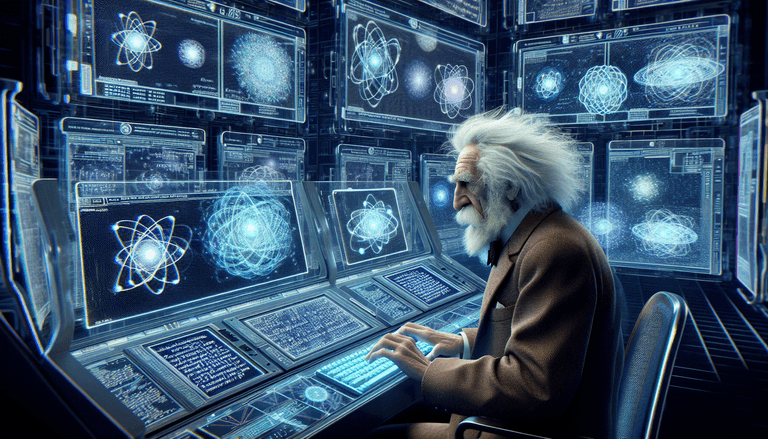Picture this: a cluttered desk in early 20th-century Berlin, strewn with parchment, quill pens, and coffee cup stains that could rival the Milky Way. Behind it sits our legendary genius, Albert Einstein, who’s deep in thought yet again. The lore says he’s conjuring up ideas that will change the world. But imagine, if you will, a curious twist in this chapter of history: a quantum computer casually sitting next to his ink pot, gently humming as it crunches numbers faster than the speed of light (well, almost).
An Electronic Eureka Moment
Now, we all know Einstein had a knack for revolutionary thought, hypothesising with a flair for what we like to call "world-shattering revelations." But with a quantum computer at his disposal, perhaps he’d have had an eureka moment with a little more spin. Get it? Spin? Quantum mechanics? I digress.
Our dear Albert was already dodging mainstream science’s expectations and wading shin-deep in quantum theory’s peculiar waters. It’s not hard to imagine him embracing the hilariously complicated landscapes a quantum computer could plot out with its qubits, so unassumingly sitting there, a fancy paperweight, until activated.
A Leap Through Time… and Entangled States
Picture this: Einstein pondered the aspersion thrown by quantum mechanics at relativity. Relativity assumes a smooth, sensibly connected universe, essentially, a scientific German sausage fest balanced on space-time. Quantum mechanics, however, deals in the strange and random. Frankly, it’s more chaotic than Einstein’s hairdo on a bad day.
What if he could have foreseen entangled particles spinning in unison like synchronised swimmers through the fabric of relativity? Perhaps he’d have thought twice about branding quantum entanglement as "spooky action at a distance" and instead dubbed it "an exotic twist at a non-intuitive range."
With the assistance of a quantum computer, Einstein might’ve charted paths through the labyrinth of quantum mechanics, effectively making theoretical short shrift of Schrödinger’s feline escapades. Who’d need a box of hypothetical cats when you’ve got silicon smarts to do the juggling?
From Physics to Philosophy to Full-On Geek Mode
Certainly, Einstein was no stranger to thinking outside the blackboard. But his sideline career in philosophical musings, pondering the nature of reality, may have metamorphosised into a full-blown geek fest with quantum computing. How does one explain the intricacies of relativity while juggling quantum bits? With a byte of data, naturally!
Imagine the twice-baked complications of quantum paradoxes tested at the speed of algorithms. With a touch of humour and a vast trove of patience, he’d be riffing hypotheses with the click of a mouse, a cat-and-mouse, if you will.
Moreover, Einstein might have embraced the world’s first quantum computing conference, exclaiming, "E=MC²," standing for "Extra geeky = Mighty calculations squared", a whispered note passed among like-minded visionaries with a wink.
Untangling the Internet’s Web, Entangled Networks Style
Let’s not ignore the intrigue of how Einstein’s burgeoning brainchild, (pun alert) The Theory of Entangled Networks, might’ve inspired future technology. Picture the World Wide Web, nodes like stars against a dim sky traced by his equations. An elevated Internet, “the Einstein Net,” connecting everything, from hypothetical musings to the latest cat memes (because what’s the Internet without cats, quantum or otherwise?).
Einstein’s social impacts could cascade across time. Imagine LinkedIn or Facebook with Einstein proactively sparking discussions about photons, all notified by emails wrought with majestic fury and electromagnetic quips.
Relatively Speaking, Bowing Out with a Quip
In this delightful diversion through Technicolour time, it’s important to remain grounded. Einstein’s brilliance was no less remarkable sans tech. Yet, imagining how quantum computing might’ve stirred his creative stew is pleasingly whimsical. Would he have solved even more mysteries or simply plumbed deeper into existing conundrums, like a child loose in a room full of Rube Goldberg machines?
As Einstein famously quipped, "God doesn’t play dice." But with a quantum computer? Who’s to say Einstein wouldn’t have been first in line at a tech fair, rolling dice with the grand programmer in the sky, or, at the very least, pestering the dice vendor for calibration statistics.
And so, as we marvel at our hypothetical account of Einstein armed with silicon sorcery, let us doff our hats, pressing on in our own nonlinear journey through time and technology. Dare I ask, what might Timewarp Terry explore next? The Crusades with instant messaging, perhaps?







